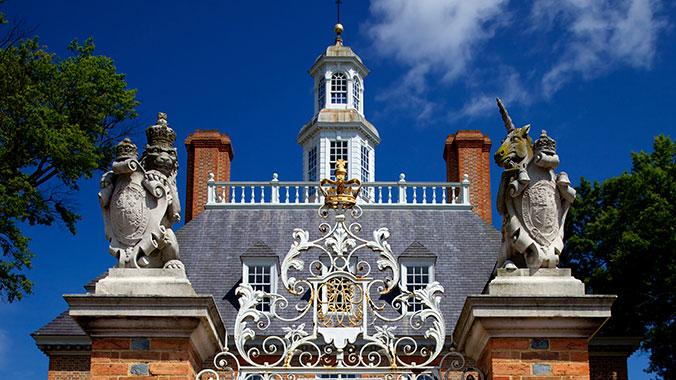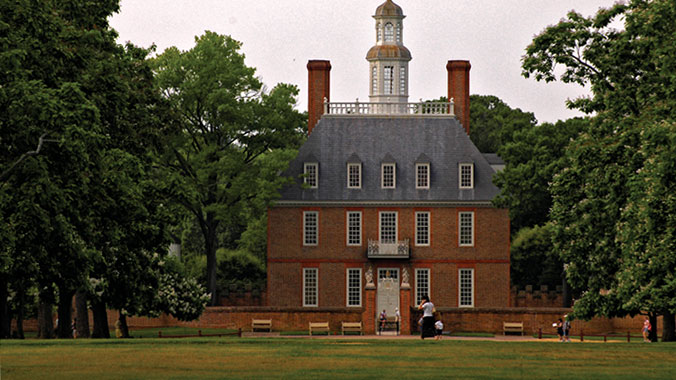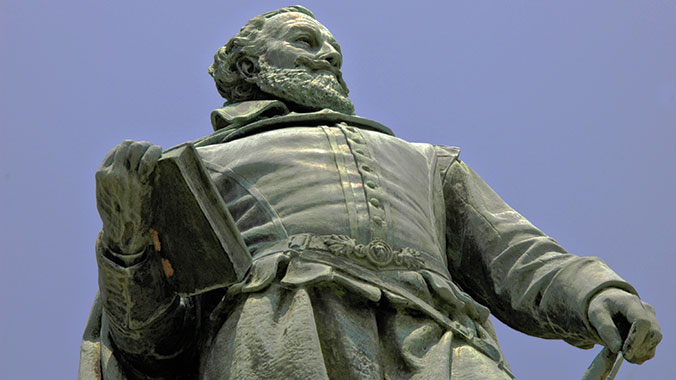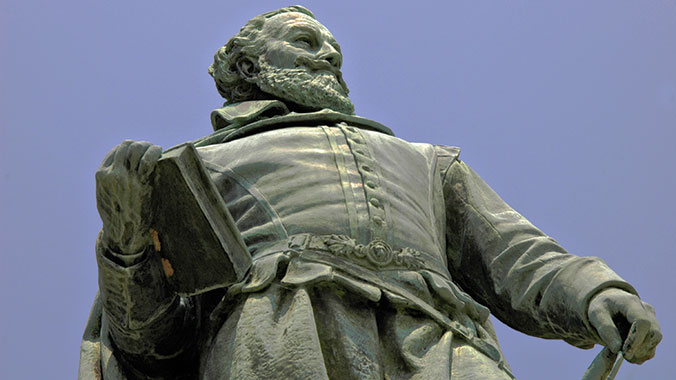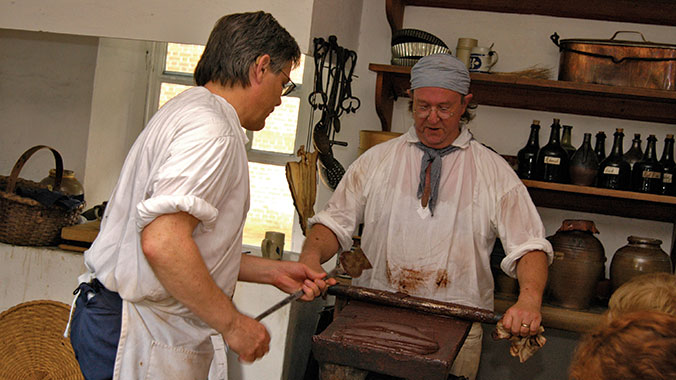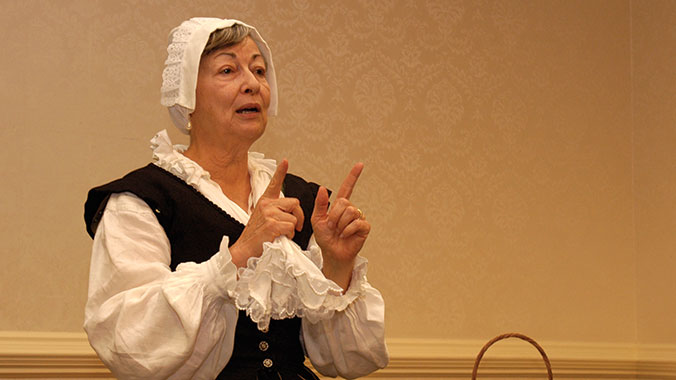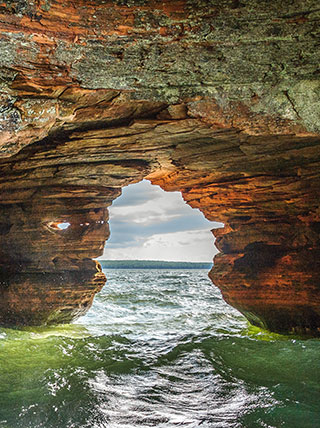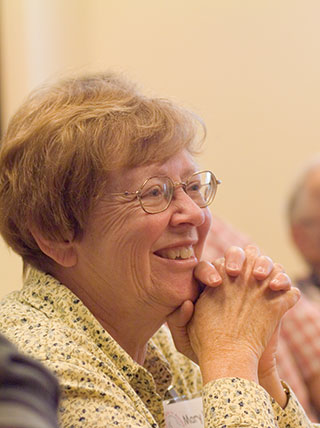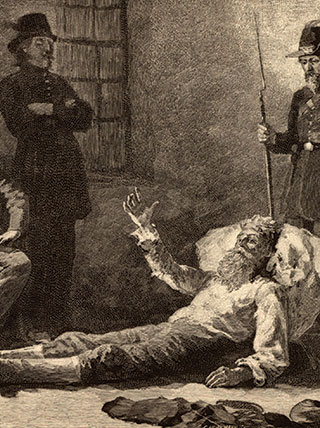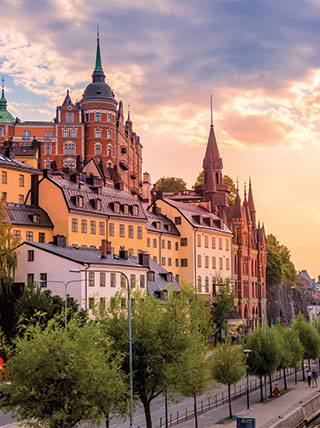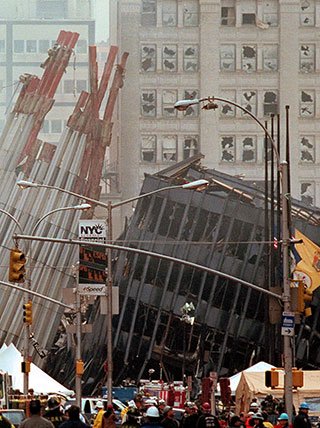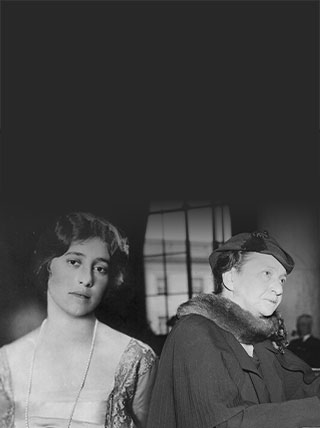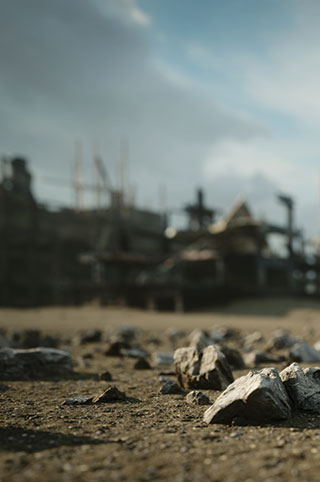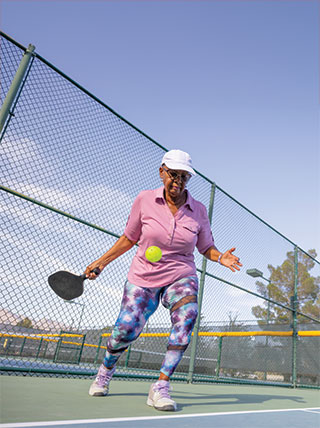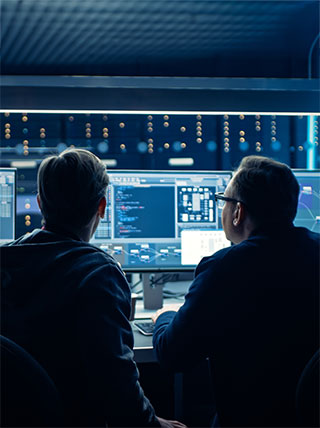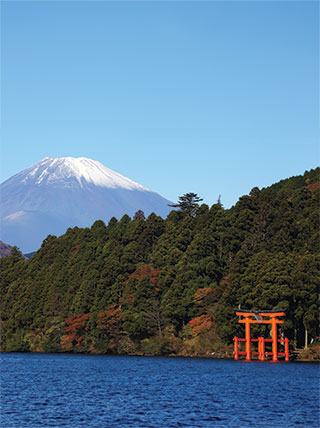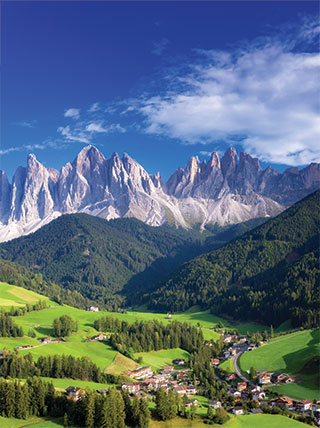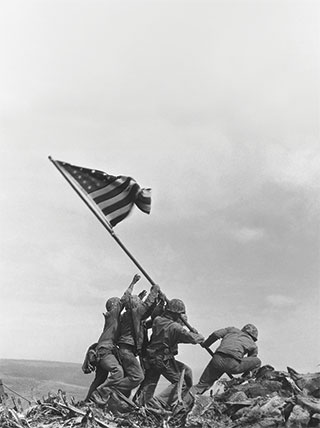
From Colony to Revolution: Jamestown, Williamsburg, Yorktown
Enroll with Confidence
We want your Road Scholar learning adventure to be something to look forward to—not worry about. Learn more
Protecting the Environment
We offset a portion of the emissions created by your travel. Learn more
At a Glance
What You'll Learn
- Relish an in-depth look with the head curator at the incredible Jamestown Rediscovery Project, where archaeology is uncovering the original fort.
- Experience William & Mary's Wren Building and the historical Duke of Gloucester Street, heart of Colonial Williamsburg, with a knowledgeable interpreter.
- Follow your instructor across the earthworks to the field where American independence was guaranteed by the surrender of Lord Cornwallis.
General Notes

Please note: This expert may not be available for every date of this program.




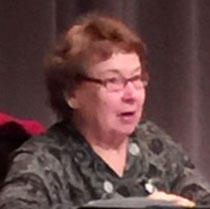










Activity note: Hotel check-in from 4:00 p.m. If you arrive early, you may leave your luggage at the front desk.
Afternoon: After you have your room assignment, join us at the Road Scholar table to register with the program staff, get any updated information, and confirm the time and location of the Orientation session. If you arrive late, please locate your Group Leader and let them know you have arrived. Your program materials will be sent to you a few days before the program, digitally, through your roadscholar.org account. This includes your program itinerary, any related handouts, and restaurant/free time suggestions. Please plan to print them out and bring along to the program, utilize the hotel's business center to access them, or view them on your own personal electronic device. At orientation, the Group Leader will greet everyone with a warm welcome and lead introductions. We will review the up-to-date program schedule and any changes, discuss roles and responsibilities, logistics, safety guidelines, emergency procedures including contact numbers for key staff, and answer any questions you may have. Indicated times are approximate; program activities and schedules may need to change due to local circumstances. In the event of changes, we will alert you as quickly as possible. Thank you for your understanding. Scheduled free time is reserved for your personal independent exploration. Please be aware that program activities, schedules, and personnel may need to change due to local circumstances. In the event of changes, we will alert you as quickly as possible. Thank you for your understanding. Continue getting to know your fellow participants, settle in, and get a good night’s rest for the day ahead.
Dinner: In our private dining area at the hotel.
Evening: We begin our immersion in colonial and revolutionary Virginia with an expert presentation on Williamsburg. Learn about the town’s history from its beginnings when the colonial capital moved from Jamestown to Middle Plantation. Follow its growth through the 18th century to its height during the Revolution. Then trace its decline with the removal of the capital to Richmond, leaving little more than the College and the hospital for the insane. Finally gain an appreciation for its phoenix-like rise in the early 20th century thanks to vision of a local minister and the generosity of John D. Rockefeller, Jr., resulting in today’s treasure of colonial American interpretation.
Activity note: This program includes significant physical activity. Today's field trip includes an extended walk of nearly a mile round trip; slightly rolling terrain, paved and gravel paths; quite a bit of standing, few resting places. Those who are concerned about the physical challenges can remain in the Visitor Center that offers both detailed exhibits and a fascinating "in the round" video of the Jamestown story. The dig site is about half way on the walk and the Archaearium is at the far end.
Breakfast: Enjoy the enhanced continental breakfast at the hotel. Options will include cereal and oatmeal, fresh whole fruit, hard-boiled eggs, toast, muffins and breads with various spreads and hot sandwich options.
Morning: In an illustrated two-part presentation, an expert associated with Historic Jamestowne provides a fascinating, in-depth look at the incredible Jamestown Rediscovery Project that has been underway for more than 20 years. The site — where the first English settlers built a fort to establish a permanent settlement in North America — was long thought lost to erosion by the James River, but through the perseverance of a dedicated team of archaeologists it has slowly been revealing its incredible secrets. After a morning of classes, depart via motor coach for Historic Jamestowne.
Lunch: Enjoy lunch with your group onsite at Historic Jamestowne.
Afternoon: We begin our afternoon at the Visitor Center, where you can see a film and exhibits later on your own. Then, led by an expert, we will explore the site of the original fort and view the area now under investigation by archaeologists. Depending on the season, you may see members of the team actively working at the dig. Pass through the church tower — all that remains of the 17th century building — and sit in the cool interior of the reconstructed church. Gaze out over the James River and imagine the three small ships bobbing at anchor on the broad waterway. You will also have time to see many of the artifacts uncovered at the dig and exhibited in the architecturally unique Archaearium, with a "see-through" floor that lets you view the foundation of the 17th century statehouse.
Dinner: At the hotel
Evening: In our hotel classroom, we will learn about Williamsburg's indigenous peoples with an expert speaker, tracing their interactions with the government and settlers of early Virginia. Learn about the many different tribes with whom the colonists interacted as they moved farther and farther into the wilderness. Investigate the changing roles of the tribes as they negotiated not only with encroaching settlers, but also with other indigenous groups, and as war approached, with the competing factions among the colonists.
Activity note: The Settlement field trip includes an extended walk of nearly a mile down and back up a gently sloping hill. Those who wish can board one of the reconstructed ships via a gangway and investigate the decks by climbing steep, narrow stairs. Anyone preferring a less active experience can explore extensive galleries in the indoor museum; special exhibits on the second floor can be reached by elevator.
Breakfast: Enjoy the enhanced continental breakfast at the hotel. Options will include cereal and oatmeal, fresh whole fruit, hard-boiled eggs, toast, muffins and breads with various spreads and hot sandwich options.
Morning: Our first session today focuses on slavery in the 18th century. With a noted expert, we will examine the evolution of slavery from its introduction in the 17th century, from a form of indentured servitude to lifelong bondage. We will also consider the impact of the “peculiar institution” on families black and white, cultural influences brought to America from Africa, attitudes toward race in the colonial era including changes in laws that reflected and institutionalized the status of Africans in Virginia, and other facets of the lives of both masters and slaves. What better way to experience a different time than to meet someone who lived then? We will next engage in a conversation with Angela, the first named African woman in Jamestown, personified by a talented and knowledgeable costumed interpreter. You will quickly begin to feel that you are truly in the presence of one of the first enslaved Africans in Jamestown as she reflects on her enslavement and life in early Virginia.
Lunch: Enjoy a box lunch on site with your group at Jamestown Settlement.
Afternoon: Following up on our Historic Jamestowne field trip, we’ll explore the adjacent Jamestown Settlement museum and its re-created early colonial environment. Here you will have opportunities to investigate exciting interactive exhibits in the newly renovated museum, stroll through a village of Eastern Woodland Indians, talk with “settlers” in the fort, and walk the decks of the three ships (replicas) that brought the first adventurers to Virginia in May of 1607. These reconstructed venues provide a colorful, compelling look at life in the early 17th century, illustrating the story you saw previously in artifacts and outlines at Historic Jamestown. You will have some free time at your own pace to see what interests you most, whether special exhibits, short films, or chatting with interpreters around the site.
Dinner: Dinner is on your own this evening. This meal has been excluded from your program cost to explore the local fare on your own or with new friends.
Evening: At leisure. Feel free to relax, spend time with new Road Scholar friends, or check out available activities from the information in your preparatory materials. The Group Leader will be happy to offer suggestions and give directions.
Activity note: The Historic Area walk is about 1-1/2 miles in one direction with a good deal of standing; few opportunities for rest stops; level, pebbled streets, occasional benches along the way. For anyone concerned about the physical challenges, there is a bus available about half-way that stops a short block from the College. We will walk from the visitor's center to the Governor's Palace about 1/2 mile, taking in beautifully landscaped scenes along the way. A shuttle will be available as an alternative.
Breakfast: Private buffet breakfast in the conference hall.
Morning: As preparation for our extensive walking field trip, we will have an expert presentation from a local historian, highlighted by archival slides on Williamsburg before and after what is lovingly called the Restoration. They will discuss the physical changes that took place as well as the attitudes and reactions of locals. Learn more about the reinvention of Virginia’s old colonial capital from the Great Depression through World War II, the involvement and generosity of John D. Rockefeller, Jr., and the town’s continuing evolution.
Lunch: At the hotel.
Afternoon: Our field trip this afternoon will begin at the east end of the historic town, from which we will stroll down historic Duke of Gloucester Street, heart of Colonial Williamsburg. This walk will highlight some of the most interesting features of the Restored Area, including the reconstructed Capitol, Governor's Palace, homes, and tradesmen's shops. We will also view gardens, urban plantations, and even the Public Gaol (jail) for a thorough overview to guide your personal independent exploration on Day Five. The College of William and Mary is adjacent to Colonial Williamsburg. The last stop of the afternoon is the college’s Wren Building, oldest continuously used academic building in the country, built before the town existed, and the first building to be restored during the Restoration. Sit on the hard benches as the early students did and learn about a university education in the 18th century. We will finish with a visit to the Wren Chapel for a concert of period music on its 18th century pipe organ, one of the four oldest in the U.S., with an opportunity to learn about the instrument.
Dinner: At the hotel.
Evening: We gather for an evening of African-American music and storytelling. With a talented singer/storyteller, take a sweeping journey through several centuries of African-American cultural tradition as it evolves from its roots in Africa through transformation during years of indentured servitude and slavery to emancipation during the Civil War.
Activity note: Transportation via motorcoach to the tavern lunch. After lunch, those wishing to explore Colonial Williamsburg can opt to be dropped off there rather than returning to the hotel. During the afternoon free time, participants can walk as little or as much as they want in the Restored Area or explore other venues (no transportation provided).
Breakfast: Enjoy the enhanced continental breakfast at the hotel. Options will include cereal and oatmeal, fresh whole fruit, hard-boiled eggs, toast, muffins and breads with various spreads and hot sandwich options.
Morning: We'll start our morning with another delightful costumed interpreter posing as a Woman of the Town, Jane Vobe. Mrs. Vobe will entertain you with tales of life in the colonial village, the impact of the revolutionary crisis, and the challenges to an independent woman. Next, we’ll enjoy the talents of an accomplished musician as we learn about how music merges with tradition in colonial and revolutionary times.
Lunch: At a colonial style tavern, we’ll enjoy a plated lunch of stew, Virginia ham biscuits, fruit salad, dessert, and beverages including coffee and tea. We’ll dine in 18th century fashion in this authentically reconstructed inn serving traditional Southern fare. The building, built in 1962, incorporates architectural salvage over 200 years old, including paneling from Carter's Grove Plantation. Transportation to/from the tavern will be by motorcoach.
Afternoon: Free Afternoon. Take this opportunity for personal independent exploration to see and do what interests you most. Please refer to the list of Free Time Opportunities. The Group Leader will be happy to offer suggestions and give directions. With your Colonial Williamsburg pass, you can independently explore what appeals to you most in the town. At the Colonial Williamsburg Visitor Center, accessible by shuttle, you can view the classic film “Story of a Patriot.” You are also free to visit other sites in the area on your own, or simply relax.
Dinner: This meal has been excluded from your program cost to explore the local fare on your own or with new friends.
Evening: At leisure.
Activity note: Walking along the Yorktown earthworks requires balance and stamina because of the steep sides of the works. Those concerned about the physical challenges can explore the Visitor Center galleries until the group returns. The walk at Surrender Field is about half a mile round-trip. The American Revolution Museum is fully accessible, but the grounds include some hilly areas and rough paths.
Breakfast: Private buffet breakfast in the conference area.
Morning: In an extended two-part class, we welcome another costumed interpreter as our First Lady Martha Washington. Learn about her life and influence as an example of strength throughout the Revolutionary War and emergence of our new nation. Next, receive an introduction to the course of the Revolutionary War in the Tidewater area, thereby setting the stage for our field trip to Yorktown. Hear from an expert about army life and maneuvers during the war. Explore Washington's campaign, coordinated with movements of the French fleet, that trapped British Lord Cornwallis at Yorktown, leading to his surrender and eventually to American independence.
Lunch: At the hotel.
Afternoon: We will board a bus with our group leader and head to the battlefield where climactic events of 1781 unfolded. We will be able to get out and walk around for a closer look at siege lines to visualize the opposing forces facing off. At Surrender Field, imagine the defeated British turning over their arms to the victorious American and French forces as their military band (allegedly) played “The World Turned Upside Down” — surely an understatement as far as Lord Cornwallis was concerned! From the battlefield, we move on to the American Revolution Museum at Yorktown, with many period artifacts, immersive experiences, dioramas, interactive exhibits, and short films. We finish our field trip at the museum's recreated 1780s farm, complete with a house, kitchen, tobacco barn, crop fields, and herb and vegetable garden.
Dinner: Farewell dinner at a local restaurant to include salad, choice of entrée, dessert, and coffee, tea, or water. Additional beverages available for purchase.
Evening: Enjoy the talents of an accomplished musician as he introduces a variety of fascinating instruments typical of the Revolutionary era. Some will be familiar, but others may be quite a surprise.
Activity note: Hotel check-out is by 11:00 a.m.
Breakfast: Enjoy the enhanced continental breakfast at the hotel. Options will include cereal and oatmeal, fresh whole fruit, hard-boiled eggs, toast, muffins and breads with various spreads and hot sandwich options.
Morning: We will examine the status of women in the colonial era, very different than it is today, and not just because they could not vote. Explore the "sphere" in which 18th century women of all classes and colors were expected to function, centered on home and family. Learn about women's legal standing and how some enterprising ladies found ways around the restrictions of their time.< Did you know that according to USA Today, Colonial Williamsburg is among the top ten chocolate destinations in the world? To bring the week to a delicious end we’ll learn about the history of chocolate making in colonial Williamsburg. Not only will we get to assist with the preparation, we will enjoy a sample of this traditional holiday treat. This concludes our program. We hope you enjoy all your Road Scholar learning adventures and look forward to having you on rewarding programs in the future. We encourage you to join our Facebook page and share photos of your program. Visit us at www.facebook.com/rsadventures. Best wishes for all your journeys!
Recommended For You


